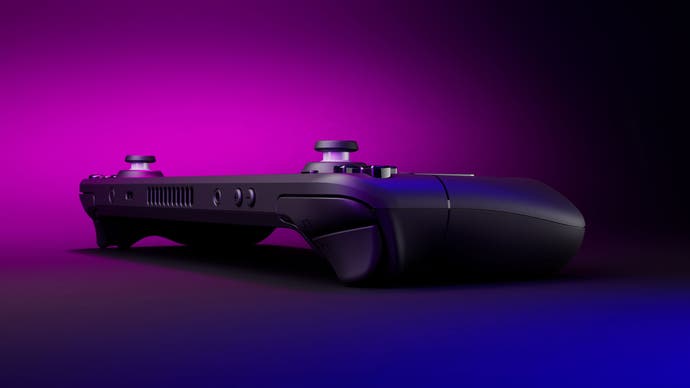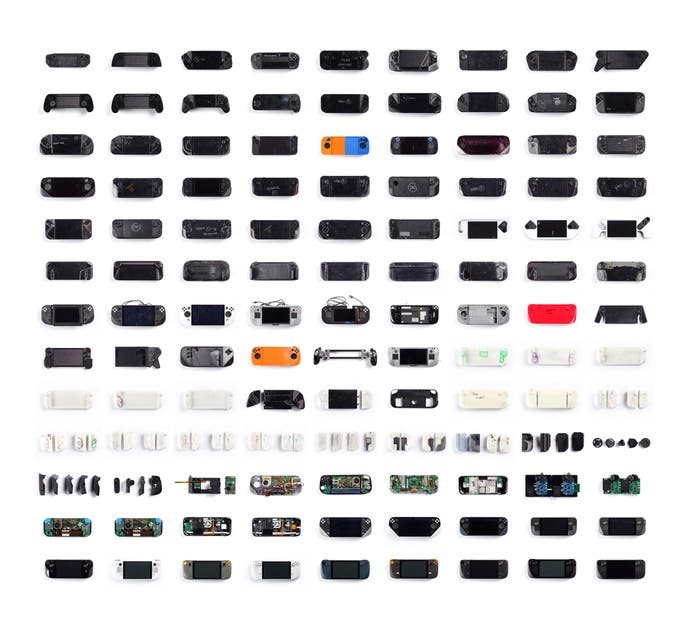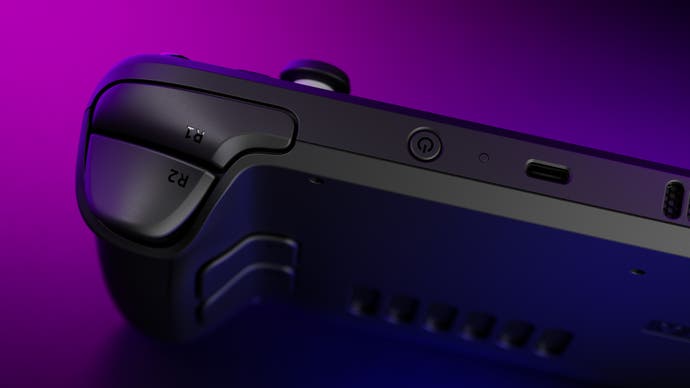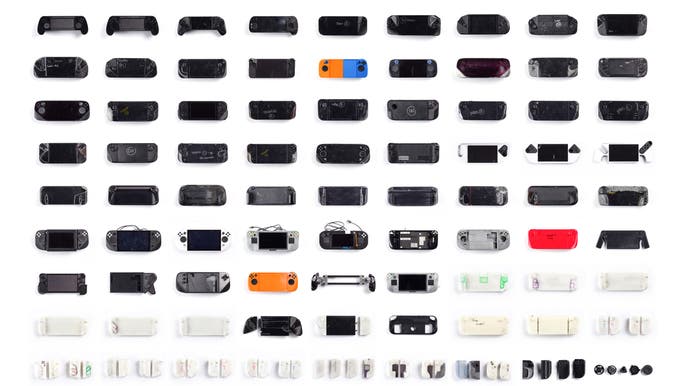Valve already has big ideas for the next generation of Steam Deck machines
Gabe Newell on taking PC games into the mobile space.
"It's something that, personally as a gamer, I've wanted for a long time, right? As soon as you start playing PC games, you're like, okay, I want something that gives me the full fidelity of experience with really great inputs that I can use in the mobile space. The first time, I think I wanted something like this was back in the 1990s, you know, when I was first playing PC games."
Gabe Newell is, I think it's fair to say, very excited about the Steam Deck. After a short delay and much, much excitement, the portable PC is finally here and it's quite possibly Valve's most exciting piece of hardware to date. Or more exciting than one of the last notable ones, at least - the much-heralded Steam Machines which caused much excitement upon their announcement in 2013 but never really gained a foothold with Valve moved to assure people the platform wasn't entirely dead just three years after the machines came out in 2015.
The amount of interest in Steam Deck is in stark contrast to the shrug that met the Steam Machines back then, but it's not really so different in its approach - indeed, the Deck's simply an extension of the work done with the introduction of Big Picture mode that laid the groundwork for the Machines, and a further, more focussed repositioning of PC gaming away from the desktop.
"I think of everything we try to do as a sort of block," Newell says of how Steam Machines informed the Deck. "You're building the wall and you have to build a bunch of the components as you go along. The Steam Controller has had a big impact on our thinking on input technologies and I think one of the big takeaways from the Steam Machine is we came to the conclusion that if we want to push these kinds of initiatives, we really need to do it in-house where we can solve all the problems that we see as being of greatest significance both to gamers and to software developers."
I've spent a few weeks with the Steam Deck and have been impressed with what Valve's achieved, though the device doesn't come without some caveats. It's a fiddly, sometimes unwieldy thing - the fiddliness part of the territory when it comes to PC gaming, and also when it comes to wrangling as much of Steam's library onto a portable machine. Part of the fun - and frustration - comes from seeing how your back catalogue fairs on the machine, but I wonder how much newcomers to Valve's ecosystem are being catered for, and whether it might broaden the gaming audience in the same way the Switch did when it first launched back in 2017.

"I think if we ignore the fact that it's a gaming device and just look at it in terms of price performance, and for its CPU and GPU, it's a great device there," says Newell. "So I think we're comfortable, ignoring the fact that it's a gaming device, that it's gonna fit in there. But it is a gaming device and that's where it's got its most compelling applications.
"One of the things that's been interesting to us, we're super hard on the entry level price point, and then our customers come back to us and far and away they're ordering the most expensive SKU that they can. It's interesting, these are all early adopters, you know, but they're saying you should have given us, you know, more storage more, you know, performance, more memory, and we would have probably been buying it. That's interesting, and that will probably shift as we start to ramp up and catch up to demand, and we'll see a shift over time to the lower price, sort of more entry level SKUs."
What's really fascinating, though, is where Valve see Steam Deck going next. It's a long-term project - and one with brighter prospects than the likes of the Steam Machines - that could take PC gaming into some interesting places if Newell's musings on where he sees the next five years of the device are anything to go by.
"Some of the conversations we're having with software developers are like, okay, this is great - but let's try to figure out what the next generation of the deck looks like," he says. "What do we want in terms of solutions for mobile gaming, for mobile PC gaming? Does that open the door to new things? We've been a fan of biometrics for a long time in terms of using that, and this is a good way, given where your hand positioning is - that gives you an opportunity to do stuff there.

"You know, all of these things relate to each other, right? A lot of the technology that we might be using and future versions of that comes, you know, from technology that we have to develop for VR. And then if you flip it around and you look at that as like a highly performant mobile PC gaming device, you sort of say, well, why can't I have that in a tetherless integrated VR solution?
"With headsets, you have a lot more ability to do things like neuromodulation or the direct sensors and stuff on people's heads, or you're looking at information that's easy to convey through sensors close to somebody's hands. All of these things tend to snowball over time, and with each one of them we think what are we going to learn? What are we going to help software developers do? How does that translate into building compelling solutions for gamers?
"Longer term, we may end up finding that there are interesting mobile-specific opportunities. If you start putting cameras on these things you may find that there are classes of game experiences that are really dependent on those.... Pokémon GO is a great example of an application that doesn't make sense in any way for desktop.
"But it's dependent on a set of facilities that today haven't really existed in PC gaming, the opportunity with subsequent versions of Steam Deck is to start to look for those kinds of applications or those kinds of capabilities, and see what sort of applications that enables. So once we start having unique gaming technologies in future versions of Deck that's when it would make a lot more sense to try to come up with custom applications and capitalise on it."

Pokémon GO on PC? It's not quite the end-game I'd anticipated when asking Newell about long-term plans for Steam Deck, but it's enlightening all the same to see where he sees the device heading, and a logical step for Steam to head into one of the most lucrative and popular areas of gaming. There's some way to go, as well as a fair few hardware iterations, so it's not as if it's happening anytime soon - and Valve's going to be plenty busy over the next few months just keeping up with demand for its new machine.
"We're certainly going to ramp up production as fast as we can," he says. "In fact, that's a lot of what we've been doing over the last six months, working with our suppliers to figure that out. We also fully expect - and one of the great things about the PC marketplace is - hopefully we're gonna see other people looking at this and saying we can ship products like this as well. So not only are we going to be trying to fill demand, but hopefully other PC manufacturers are going to recognise that the pieces are in place. And the demand for this kind of solution is high enough that they're going to figure out how to ship similar devices as well.
"The good news is demand is high. The bad news is due to the pandemic, the demand for all sorts of electronics has just skyrocketed - if you talk to Intel or AMD or Nvidia or Ford Motor Company, consumer demand has shifted. If you can't go to restaurants and you can't go to movies, you're gonna buy nicer houses, and you're going to buy more expensive electronics. There's just been a huge surge, and it's just taking a while for the capacity to catch up."









.png?width=291&height=164&fit=crop&quality=80&format=jpg&auto=webp)
